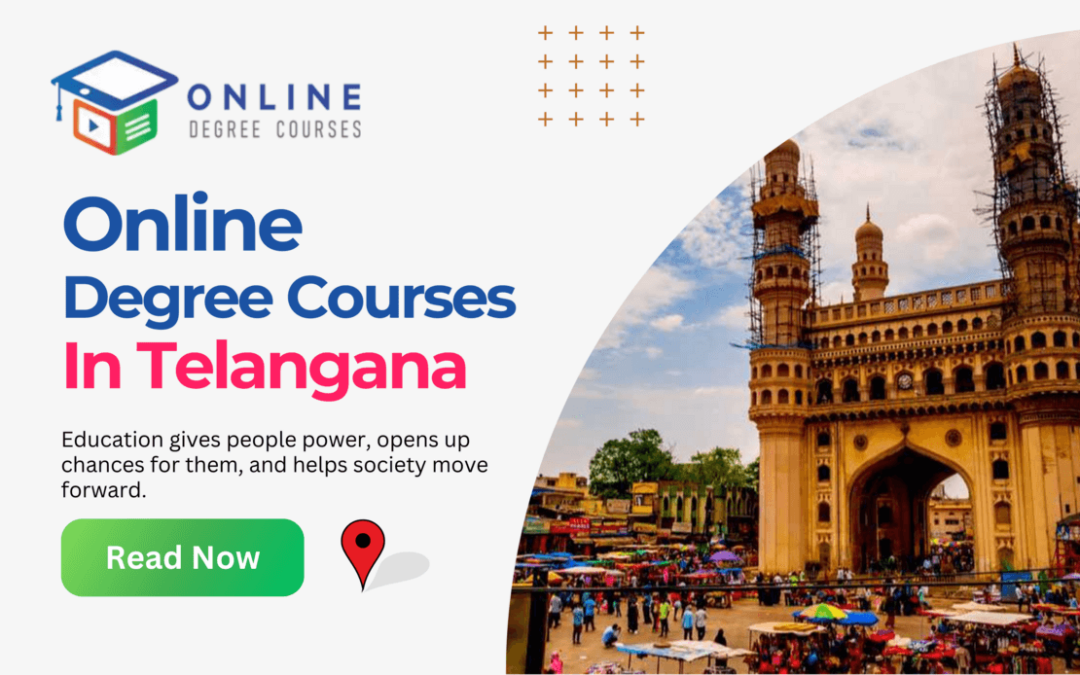Open degree courses In our fast-changing world, getting an education isn’t just something nice to have—it’s really important. Education gives people power, opens up chances for them, and helps society move forward.
Telangana understands this and has made big efforts to offer open degrees. These courses are for people who need flexible options to study. About degree courses in Telangana. At why they matter, what subjects you can study, and how you can sign up for them to start your educational journey.
Table of Contents
Understanding Open Degree Courses
Open degree courses are a flexible way to get a higher education. They let people study at their speed, no matter how old they are, what qualifications they have, or whether they’re working. And anyone who couldn’t go to regular school for different reasons.
This means more people can get a good education. So anyone who wants to learn can do it without too much trouble.
Benefits of Open Degree Courses
The proliferation of open degree courses in Telangana brings forth a myriad of benefits for learners:
Flexibility: One of the primary advantages of open courses is the flexibility they offer. Learners can study at their own pace, balancing their educational pursuits with other responsibilities such as work or family commitments.
Accessibility: Eliminate many traditional barriers to education, such as geographical constraints or stringent entry requirements. This accessibility ensures that individuals from all walks of life can access quality education.
Cost-effectiveness: Pursuing an open degree course can often be more affordable than traditional full-time programs. Additionally, learners can save on expenses like accommodation and transportation, as many of these courses offer online or distance learning options.
Skill Enhancement: Open degrees provide an avenue for skill enhancement and career advancement. Whether individuals seek to acquire new skills or upgrade existing ones, these courses offer a diverse range of subjects to cater to various interests and professional aspirations.
Career Opportunities: By obtaining a degree through open courses, individuals can enhance their employability and access better career opportunities. Many employers value the skills and dedication demonstrated by individuals who pursue education alongside other commitments.
Open Degree Courses Offered
Telangana State Council of Higher Education (TSCHE) oversees the administration and regulation of higher education in the state, including open degree courses. Some of the popular open degree courses offered in Telangana include:
Bachelor of Arts (BA): This course encompasses a wide range of subjects, including languages, literature, history, sociology, and political science. It provides a comprehensive understanding of various social sciences and humanities disciplines.
Bachelor of Science (BSc): BSc programs cover subjects such as mathematics, physics, chemistry, biology, and computer science. These courses equip students with a strong foundation in scientific principles and analytical skills.
Bachelor of Commerce (BCom): BCom programs focus on commerce, accounting, finance, and related subjects. They prepare students for careers in fields such as accounting, banking, finance, and business management.
Bachelor of Business Administration (BBA): BBA programs are designed to develop managerial and entrepreneurial skills. They cover topics such as management principles, marketing, finance, human resources, and organizational behavior.
Bachelor of Computer Applications (BCA): BCA programs focus on computer science and applications. They provide students with the knowledge and skills required for careers in software development, IT management, and related fields.
These are just a few examples of the open degree courses available in Telangana. The diverse range of subjects ensures that individuals can pursue education in areas aligned with their interests and career goals.
| University | Open Degree Courses | Subjects |
| Osmania University | Bachelor of Arts (B.A.) | History, Economics, Political Science |
| Bachelor of Commerce (B.Com) | Accounting, Finance, Business Studies | |
| Bachelor of Science (B.Sc.) | Mathematics, Physics, Chemistry | |
| Kakatiya University | Bachelor of Business Administration | Management, Marketing, Entrepreneurship |
| Bachelor of Computer Applications | Computer Programming, Database Management | |
| Bachelor of Education (B.Ed.) | Education Psychology, Teaching Methodologies | |
| Telangana University | Bachelor of Science (B.Sc.) | Botany, Zoology, Microbiology |
| Bachelor of Arts (B.A.) | Sociology, Psychology, English Literature | |
| Bachelor of Commerce (B.Com) | Corporate Accounting, Taxation, Financial Management | |
| Dr. B.R. Ambedkar Open University | Bachelor of Library and Information Science | Library Management, Information Retrieval |
| Bachelor of Social Work | Social Welfare Policies, Community Development | |
| Bachelor of Hotel Management & Catering Technology | Hospitality Management, Food Production |
How to Apply
Applying for open degree courses in Telangana is a straightforward process. Interested individuals can follow these steps to kickstart their educational journey:
Research: Begin by researching the available courses and identifying the one that best suits your interests and career aspirations. Consider factors such as course curriculum, duration, and mode of delivery (online, distance learning, etc.).
Check Eligibility: Verify the eligibility criteria for the chosen course. Open degree courses typically have minimal entry requirements, making them accessible to a wide range of learners. However, it’s essential to ensure that you meet the specified criteria.
Application Process: Visit the official website of the respective university or educational institution offering the desired course. Locate the admissions section and follow the instructions to submit your application. Be sure to provide accurate information and complete all required documentation.
Payment of Fees: Upon submitting your application, you may be required to pay the requisite application fee. The fee structure varies depending on the course and institution.
Confirmation and Enrollment: Once your application is processed, you will receive a confirmation along with further instructions regarding enrollment. Follow the guidelines provided to complete the enrollment process and secure your spot in the course.
Commence Studies: With enrollment formalities completed, you can begin your journey as a student in the open degree course of your choice. Take advantage of the resources and support services offered by the institution to make the most of your learning experience.
Conclusion
Open degree courses in Telangana are like a guiding light for people who want to continue their education but face challenges. These courses are flexible, easy to access, and offer different ways to learn. They give learners the power to chase their educational goals and grow personally and professionally.
Whether you want to get a distance education, learn new things, or just keep learning throughout your life, open degree courses can help you succeed. The process to apply for these courses is easier than ever, so why wait? Discover all the exciting opportunities waiting for you in open degree courses and start your educational journey today!
Frequently Asked Questions
Are degrees obtained through open degree courses valid for government jobs?
Yes, degrees obtained through open degree courses are generally valid for government jobs, provided they are from recognized institutions and accredited by relevant authorities.
Are open degree courses recognized by government agencies?
Yes, open degree courses are recognized by government agencies such as the University Grants Commission (UGC) in India. However, it’s essential to ensure that the institution offering the course is recognized and accredited.
Do government job notifications accept degrees from open degree courses?
Yes, many government job notifications accept degrees obtained through open degree courses. However, candidates should carefully review the specific educational qualifications required for each position.
Are there any restrictions on the type of government jobs open degree holders can apply for?
In general, there are no specific restrictions on the type of government jobs open degree holders can apply for. However, some specialized or technical positions may have specific educational requirements that candidates need to fulfill.
Government Job Applications
Do open degree holders need to provide additional documentation for government job applications?
Depending on the government department or organization, open degree holders may need to provide additional documentation to verify the validity of their qualifications. This could include proof of accreditation, recognition letters, or equivalency certificates.
Are there any differences in the acceptance of open degree courses for different government sectors?
While open degree courses are generally accepted across various government sectors, there may be differences in specific requirements or preferences depending on the nature of the job and the hiring agency. Candidates should carefully review job notifications for any sector-specific requirements.
How can candidates ensure the validity of their open degree courses for government jobs?
Candidates can ensure the validity of their by verifying the accreditation and recognition status of the institution offering the course. It’s also essential to stay informed about any updates or changes in government policies regarding educational qualifications.
Are there any equivalency tests or assessments for open degree holders applying for government jobs?
In some cases, candidates with degrees obtained through open degrees may need to undergo equivalency tests or assessments to validate their qualifications for specific government jobs. This requirement varies depending on the hiring agency and the nature of the position.
Where can candidates find information about the recognition of open courses for government jobs?
Candidates can find information about the recognition of open degrees for government jobs through official government websites, job notifications, and educational institutions offering the courses. It’s advisable to consult reliable sources and seek clarification if needed.

